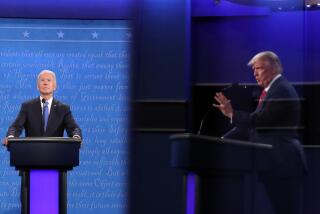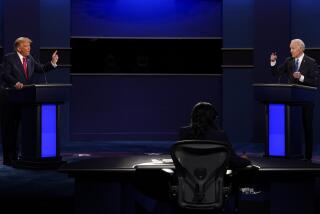Kemp-Gore Debate May Be Crystal Ball on Year 2000
- Share via
WASHINGTON — In the eyes of many political junkies, the race for the White House begins tonight.
The race for the White House in 2000, that is.
In political circles, tonight’s debate in St. Petersburg, Fla., between Vice President Al Gore and Republican vice presidential nominee Jack Kemp is attracting unusual attention because many believe it could preview the presidential matchup four years from now.
“These are the two candidates who will emerge as the two front-runners [for 2000] after this election,” said Democratic pollster Stanley B. Greenberg. “So there will be a big spotlight on the debate.”
Kemp and Gore very much make a political odd couple. Emotionally, each seems to be fitted into the wrong party. Kemp is effusive, emotional and frenetic, an old-fashioned Irish Democrat in everything but ideology. Though he can be puckishly funny, Gore is as cerebral, controlled and contained as a banker.
Kemp is the most boyish 61-year-old in American politics. Like Frank Capra’s George Bailey, Gore, 47, seems to have been born older.
What the two men share is the common experience of crashing on the runway when they ran for their party’s presidential nomination in 1988--Gore as a young senator, Kemp as a nine-term representative best known for sponsoring the supply-side tax cuts in the Reagan administration.
Today, Kemp and Gore are bound by an intense fascination with the details of public policy. Kemp’s passions are reclaiming the inner city, rewriting international economic policy and, above all, cutting marginal tax rates. Gore has been most closely associated with preserving the environment, reforming the government and wiring a policy framework for the Information Age.
“Gore and Kemp are the right kinds of candidates for this new era of politics,” said one senior White House aide. “They’re both wonky guys willing to sit for hours and talk about global warming or the gold standard. People want that. The era of larger-than-life leaders is past.”
Then again, one of the reasons Gore and Kemp both ran so poorly eight years ago was their tendency to exhaust even the most attentive audiences with extended seminars on obscure topics. Kemp, in particular, became renowned for speeches that wandered off into musty catacombs of economic theory and monetary policy. Gore’s 1988 campaign may be best remembered for his insistence on wearing identical boxy blue suits.
In recent interviews, both Kemp and Gore insisted that they are not looking ahead to a showdown in 2000 as they step onto the stage tonight.
“The old saying that six months is a lifetime in politics is certainly applicable here,” Gore said. “It’s of limited use to try and predict what would happen in either party four years from now, and I’m not spending any time speculating on that.”
But many around them are doing just that. No matter how the 1996 election turns out, these men could be measuring each other on the morning after the votes are counted. If President Clinton holds his lead, Gore would be the clear front-runner among Democrats and Kemp would likely top the polls among Republicans next winter. Even if Dole comes back to win, most Republicans believe he would serve only one term; Kemp would instantly become his presumptive successor.
If Clinton wins next month, Gore’s path to the nomination in 2000 is probably clearer than Kemp’s. Though Gore’s prospects are tied to unpredictable events in the economy--and the course of a second Clinton term if there is one--most Democrats agree that the vice president will amass a powerful combination of money, institutional support and near-universal name identification.
If Dole loses, most Republicans expect that Kemp would start off as the front-runner, perhaps sharing the top spot with retired Gen. Colin L. Powell. But Kemp would have to work to sustain his advantage. Already Republican insiders anticipate a crowded field ranging from former Vice President Dan Quayle and several Midwestern governors to such fresh faces as Texas Gov. George W. Bush and moderates Powell and Massachusetts Gov. William F. Weld (particularly if Weld wins election to the Senate this fall).
Some around him expect that if Dole loses, Kemp would quickly lay the foundation for 2000 by speaking regularly at high-profile Republican events around the country and establishing his own political action committee to help GOP candidates in 1998.
But others, who watched Kemp procrastinate and finally choose not to seek the nomination in 1996, remain uncertain that he will work to fortify his position as systematically as Gore has already begun to do. “There is a reality that nobody gives you anything in politics,” said one of Kemp’s closest political advisors. “So if you want to be president, you have to go out and seize it. Jack has the opportunity to do that, but it has to be done.”
Both Gore and Kemp are much better politicians today than they were eight years ago. During the 1988 campaign, Gore’s advisors broke their lances urging him to loosen up and reveal more of himself. Today, no one would call Gore limber in his personal appearances, but he’s learned to soften his image with self-deprecating jokes about his own stiffness; fittingly for a politician once derided as wooden, Gore has become his own best prop.
In an appearance before an audience of suburban parents in Garfield, N.J., early this month, Gore was still cool and measured, but he was able to project some of the same qualities that strengthen Clinton: empathy and a sense of understanding about the daily realities of modern family life.
If Gore is looser than in 1988, Kemp is more controlled. He still bounds around the stage like a motivational speaker. At a recent town meeting in Billings, Mont., Kemp repeatedly pressed against a rope line that organizers had set at the foot of the stage.
“This chain is not here to keep you from me,” Kemp finally said as he hovered over the people in the first row. “It’s here to keep me from you.”
But as Dole’s running mate, Kemp has displayed much more discipline than he did as the headliner himself. His speeches are crisp and focused; he seems unhurried and relaxed.
“I wasn’t ready before,” Kemp said in an interview aboard his campaign plane. “I’m not saying I am wiser or more patient . . . but I feel comfortable far more today than I did in 1988 or ’80 or ’92.”
In 1988, Kemp focused overwhelmingly on economic issues; more expansive now, he gives fully equal billing to his calls for the GOP to reach out to minorities and reclaim inner cities by cutting taxes and regulations. Compared to 1988, Kemp is less likely to quote Adam Smith and more likely to use language inflected by religion, as when he pleads the nation’s obligation to care “about the poor, the lost, the least unto Him.”
Above all, Kemp tries to offer a Reaganesque optimism about the future--a viewpoint he lately has taken to contrasting to what he portrays as pessimism in Gore’s concerns about the environment.
In the conversation aboard his plane, Kemp described Gore as a “Malthusian,” referring to the 18th-century British economist Thomas Robert Malthus, who contended that rising population would inevitably compound poverty.
A moment later, Kemp seemed dissatisfied with that description.
“No, he’s a neo-Malthusian,” Kemp said. “He’s fearful of people having babies, and automobiles being produced.”
A moment later, Kemp wasn’t satisfied with that description either.
“That’s hyperbole in which I don’t want to engage,” he said. “But he does have an attitude that the sky is falling, and it isn’t. The air is cleaner, the water is purer. It’s not perfect. We have to have standards and common-sense regulation. But he has got a very limited view of our ability to live on this planet Earth with a population of 5 or 6 or 7 billion. He fears the environment more than he should.”
Gore, not surprisingly, doesn’t think of himself as a Malthusian, neo- or otherwise. “My outlook on the future is extremely optimistic and positive; always has been,” he said, sitting in a small conference room at the Garfield Public Library last week. “I think we can create more good jobs by accepting the responsibility we have to clean up the pollution in our country and our world.”
Gore fished into his shirt pocket and pulled out a scrap of paper on which he had scribbled a quote from Kemp about Clinton’s 1993 deficit-reduction plan. “It will destroy jobs, increase the budget deficit [and] cripple growth,” Gore read, quoting Kemp.
Then Gore looked up. “That doesn’t sound very optimistic.” He paused and lowered his voice funereally. “That sounds gloomy and pessimistic.”
Sounds like these two men are ready for the opening bell--tonight, and perhaps for the next four years.
* RELATED STORIES: A5
* STRONG DELIVERY: Jack Kemp learned the art of scrambling while starring as quarterback at Occidental College in the mid-1950s. C1
(BEGIN TEXT OF INFOBOX / INFOGRAPHIC)
Debate on TV
Tonight’s debate between Al Gore and Jack Kemp will be televised on ABC, CBS, NBC, PBS, CNN, C-SPAN and MSNBC at 6 p.m. PDT.
More to Read
Get the L.A. Times Politics newsletter
Deeply reported insights into legislation, politics and policy from Sacramento, Washington and beyond. In your inbox twice per week.
You may occasionally receive promotional content from the Los Angeles Times.










